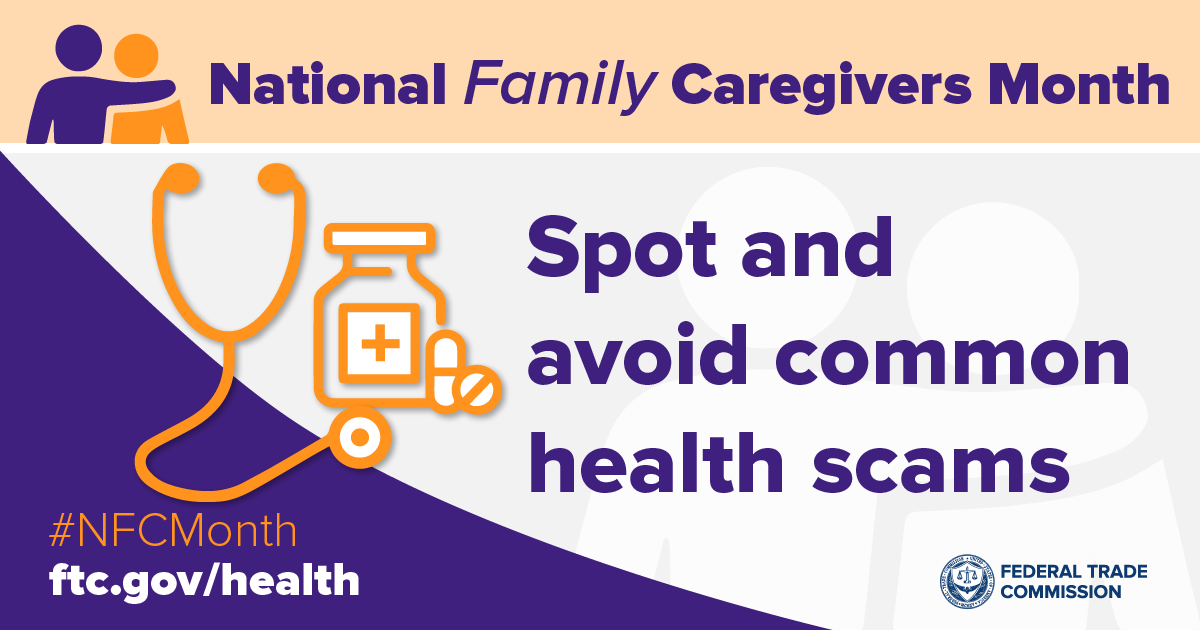 As a caregiver for a family member with special health needs, you know that shopping, making meals, or just regularly spending time with someone who can’t get out much can profoundly improve their quality of life.
As a caregiver for a family member with special health needs, you know that shopping, making meals, or just regularly spending time with someone who can’t get out much can profoundly improve their quality of life.
But being a caregiver is stressful, and scammers know that, too. In fact, dishonest companies will say almost anything to get you to buy their product or service. So, as part of National Family Caregiver’s month, here are steps to take before you buy any health product or service — for yourself or someone else.
- Do some research. Search for the name of the treatment or product online, plus the words “review,” “complaint,” or “scam.”
- Ask a health professional first. Find out:
- Does this product or treatment actually work?
- What’s the scientific evidence?
- How will it interact with other supplements or drugs the person you’re caring for takes?
- Be skeptical about products that come with guarantees or promises. Some companies want to take advantage of your hope.
- Know that “natural” doesn’t mean either safe or effective. In fact, “natural” can be both harmful and ineffective. And some “natural” products might interfere with proven treatments recommended by a doctor.
- Evaluate the claims. Ads must be truthful, not misleading. But remember, you are the best defense against health scams. Don’t assume that some government agency has approved a claim just because you see it in an ad.
- Know that the government wouldn’t hide proven remedies from you. If an ad offers a treatment that the seller claims the government or pharmaceutical industry doesn’t want you to know about, it’s a scam.
If you think you’ve spotted a health scam, tell your friends and family about it. Then tell the FTC at ReportFraud.ftc.gov. Your reports help the FTC and our law enforcement partners build cases and stop scammers.

It is your choice whether to submit a comment. If you do, you must create a user name, or we will not post your comment. The Federal Trade Commission Act authorizes this information collection for purposes of managing online comments. Comments and user names are part of the Federal Trade Commission’s (FTC) public records system, and user names also are part of the FTC’s computer user records system. We may routinely use these records as described in the FTC’s Privacy Act system notices. For more information on how the FTC handles information that we collect, please read our privacy policy.
The purpose of this blog and its comments section is to inform readers about Federal Trade Commission activity, and share information to help them avoid, report, and recover from fraud, scams, and bad business practices. Your thoughts, ideas, and concerns are welcome, and we encourage comments. But keep in mind, this is a moderated blog. We review all comments before they are posted, and we won’t post comments that don’t comply with our commenting policy. We expect commenters to treat each other and the blog writers with respect.
We don't edit comments to remove objectionable content, so please ensure that your comment contains none of the above. The comments posted on this blog become part of the public domain. To protect your privacy and the privacy of other people, please do not include personal information. Opinions in comments that appear in this blog belong to the individuals who expressed them. They do not belong to or represent views of the Federal Trade Commission.